老子英文介绍
介绍老子生平英文作文
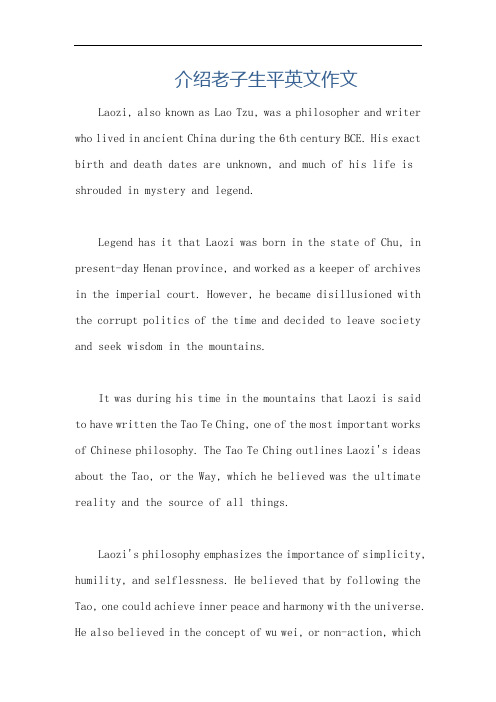
介绍老子生平英文作文Laozi, also known as Lao Tzu, was a philosopher and writer who lived in ancient China during the 6th century BCE. His exact birth and death dates are unknown, and much of his life is shrouded in mystery and legend.Legend has it that Laozi was born in the state of Chu, in present-day Henan province, and worked as a keeper of archives in the imperial court. However, he became disillusioned with the corrupt politics of the time and decided to leave society and seek wisdom in the mountains.It was during his time in the mountains that Laozi is said to have written the Tao Te Ching, one of the most important works of Chinese philosophy. The Tao Te Ching outlines Laozi's ideas about the Tao, or the Way, which he believed was the ultimate reality and the source of all things.Laozi's philosophy emphasizes the importance of simplicity, humility, and selflessness. He believed that by following the Tao, one could achieve inner peace and harmony with the universe. He also believed in the concept of wu wei, or non-action, whichinvolves letting go of one's desires and allowing things to happen naturally.Despite his profound influence on Chinese philosophy, little is known about Laozi's life. Some scholars believe that he may have been a composite figure, representing the ideas of multiple philosophers from the same time period.Regardless of the truth of his biography, Laozi's ideas continue to resonate with people around the world. His emphasis on living a simple and virtuous life, and his belief in the power of nature and the universe, have inspired countless individuals to seek a deeper understanding of themselves and the world around them.。
老子--全英文介绍
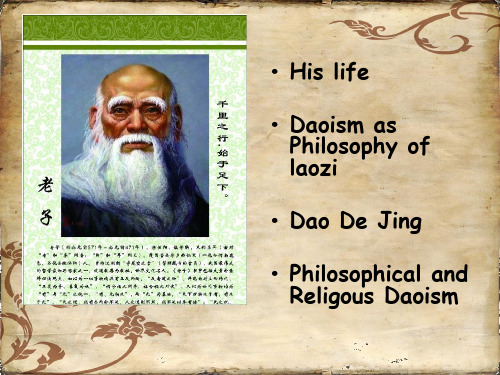
2.The way of the universe, it moves in endless cycles and never changes
3.The way man should order his life to keep it in line with the natural order of the universe
inherited and transfoemed by Daoist religion.
That's all! thank you!
made by group "Pipa"
Person:Do nonting (Wuwei); rejecting selfassertiveness(自作主张), competition, and ambition
Philosophy:the Water Way.(Representation,seek the
• established the earliest ontology (本体论)and cosmology(宇宙 学)in China
3.Generalize the universal phenomenon of unity of opposite对立统一
Conclusion
Tao gave birth to the One; the One gave birth successively to two things ,three things, up to then thousand.
•
• advanced the concept of Dao, the central concept of Laozi philosophical system and the core(中心) of classical Chinese philosophy
关于老子的英文故事
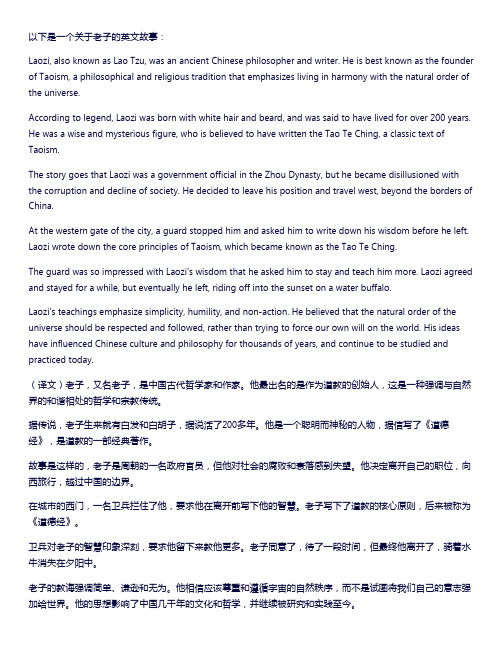
以下是一个关于老子的英文故事:Laozi, also known as Lao Tzu, was an ancient Chinese philosopher and writer. He is best known as the founder of Taoism, a philosophical and religious tradition that emphasizes living in harmony with the natural order of the universe.According to legend, Laozi was born with white hair and beard, and was said to have lived for over 200 years. He was a wise and mysterious figure, who is believed to have written the Tao Te Ching, a classic text of Taoism.The story goes that Laozi was a government official in the Zhou Dynasty, but he became disillusioned with the corruption and decline of society. He decided to leave his position and travel west, beyond the borders of China.At the western gate of the city, a guard stopped him and asked him to write down his wisdom before he left. Laozi wrote down the core principles of Taoism, which became known as the Tao Te Ching.The guard was so impressed with Laozi's wisdom that he asked him to stay and teach him more. Laozi agreed and stayed for a while, but eventually he left, riding off into the sunset on a water buffalo.Laozi's teachings emphasize simplicity, humility, and non-action. He believed that the natural order of the universe should be respected and followed, rather than trying to force our own will on the world. His ideas have influenced Chinese culture and philosophy for thousands of years, and continue to be studied and practiced today.(译文)老子,又名老子,是中国古代哲学家和作家。
老子的简单介绍英文作文
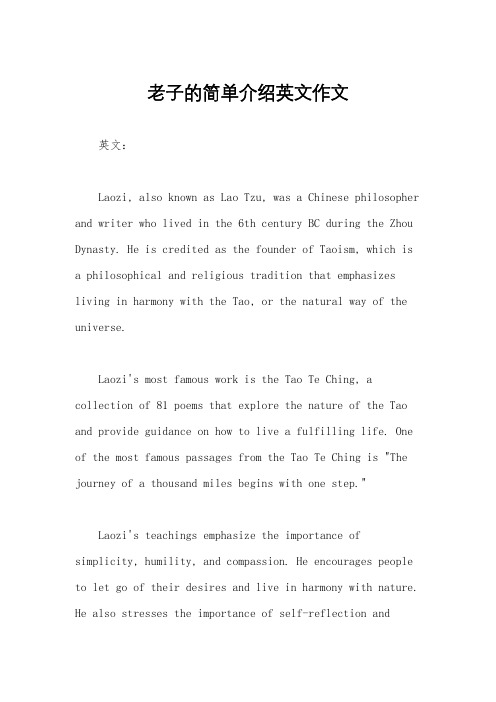
老子的简单介绍英文作文英文:Laozi, also known as Lao Tzu, was a Chinese philosopher and writer who lived in the 6th century BC during the Zhou Dynasty. He is credited as the founder of Taoism, which is a philosophical and religious tradition that emphasizes living in harmony with the Tao, or the natural way of the universe.Laozi's most famous work is the Tao Te Ching, a collection of 81 poems that explore the nature of the Tao and provide guidance on how to live a fulfilling life. One of the most famous passages from the Tao Te Ching is "The journey of a thousand miles begins with one step."Laozi's teachings emphasize the importance of simplicity, humility, and compassion. He encourages people to let go of their desires and live in harmony with nature. He also stresses the importance of self-reflection andinner peace.One of my favorite quotes from Laozi is "Nature does not hurry, yet everything is accomplished." This reminds me to slow down and appreciate the present moment, instead of constantly rushing towards the future.中文:老子,又称为老子,是中国哲学家和作家,生活在公元前6世纪周朝时期。
老子 英语简介

▪ A new-born state doesn’t mean wanting to remain childishly ignorant; it is free of knowledge, desire, impurity or falsehood. The grow-up of human is accompanied with lose of pure minds and true self. It is a departure from true self. You are suggested to combat bloated desires.
众妙之门。
▪ First and Core inquiry of Taoism: Nature -- a comprehensive world view ( a simplistic materialism perception 朴素唯物观)
▪ Dao is the supreme and highest rule of existence (Nature) --- beyond human language (非常道)
Laozi’s Perception of Life: --- inter-changeable 反者道之动
▪ 1. inter-changeable poles of force: nameless changes
“天下皆知美之为美,斯恶已;皆知善之为善,斯 不善已。故有无相生,难易相成,长短相形,高 下相倾,音声相和,前后相随。”
▪ 人法地,地法天,天法道,道法自然
介绍老子思想的英语作文
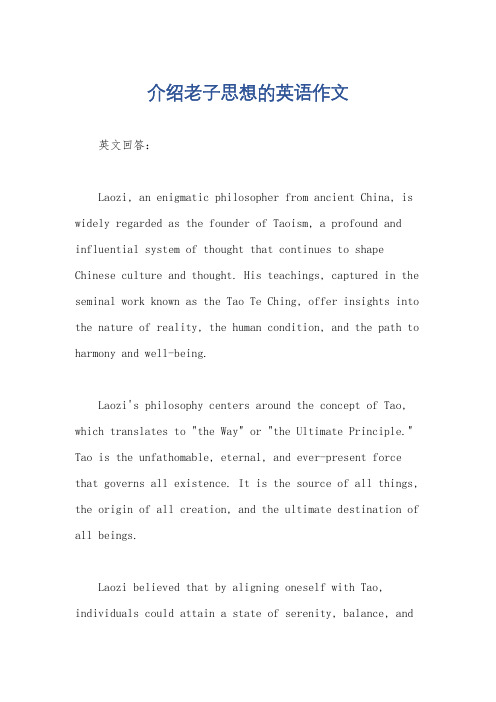
介绍老子思想的英语作文英文回答:Laozi, an enigmatic philosopher from ancient China, is widely regarded as the founder of Taoism, a profound and influential system of thought that continues to shape Chinese culture and thought. His teachings, captured in the seminal work known as the Tao Te Ching, offer insights into the nature of reality, the human condition, and the path to harmony and well-being.Laozi's philosophy centers around the concept of Tao, which translates to "the Way" or "the Ultimate Principle." Tao is the unfathomable, eternal, and ever-present force that governs all existence. It is the source of all things, the origin of all creation, and the ultimate destination of all beings.Laozi believed that by aligning oneself with Tao, individuals could attain a state of serenity, balance, andattunement with the natural world. He emphasized the importance of wu-wei, or "non-action," which refers to the practice of letting go of ego-driven desires and allowing things to happen naturally, in accordance with the rhythm of the universe.Central to Laozi's teachings is the concept of yin and yang, the complementary forces that are present in all aspects of life. Yin represents the feminine, receptive, and yielding aspects, while yang represents the masculine, active, and assertive aspects. Laozi believed that by embracing both yin and yang, individuals could achieve a state of equilibrium and harmony.Laozi's philosophy also emphasizes the value of humility, compassion, and the rejection of material possessions. He taught that true worth lies not in external achievements or social status, but rather in inner cultivation and alignment with the natural order of things.Laozi's teachings have had a profound impact on Chinese thought and culture. They have influenced everything fromart and literature to political philosophy and religious beliefs. His writings continue to be studied and revered by people around the world, offering timeless insights intothe nature of our existence and the path to a meaningfuland fulfilling life.中文回答:老子,一位来自中国古代的神秘哲学家,被广泛认为是道教的创始人。
老子 Lǎo Zǐ (circa 580-470 BC)—中国历史人物英文介绍

老子Lǎo Zǐ(circa 580-470 BC)A Legendary PhilosopherLao Zi's surname was Li and his given name was Er. Lao Zi is an honorific title. It is widely acknowledged that Lao Zi is one of the most reveredphilosophers in Chinese history. There are numerous legends about his birth, career, teaching and philosophical ideas.According to one popular legend, Lao Zi was conceived when his mother saw a star falling into her lap and he stayed in the womb for 80 years. Whenhe was born, he was already a grown man with a gray beard and long earlobes, a symbol of good fortune and longevity.He once kept the royal court archives for Zhou Dynasty (circa 11th century-256 BC). But he later resigned and went westward to propagate his ideasand philosophy.One day while riding an ox he approached the Hangu Pass and was stopped by Yinxi, a sentinel who manned the pass. As a faithful follower of Lao Zi'sphilosophy, the officer immediately recognized the great master.But, in order to ask Lao Zi to teach him something of hisphilosophy, the officer demanded the old man produce an official permit to leave thecountry.Lao Zi had no document, so he agreed to write a5,000-word essay about his philosophy in exchange for passage to the West. That essay turned out tobe the famous Daodejing (also "T ao Te Ching"), or the "Book of Virtue."Today scholars worldwide are still debating whether the book was actually written by Lao Zi or compiled by his students and disciples.However, they all agree that the book reflects Lao Zi's thinking.In the book, Lao Zi used the concept of Dao (Tao) to explain all changes in the universe. Dao, which has also been translated as "Way" or "GreatIntegrity," is deemed the mysterious source or ideal of all existences.He also put forward many dialectical ideas such as "Dao gives rise to one, one gives rise to two, two gives rise to three and three gives rise to all otherthings." He said in Daodejing: "Great talents mature slowly, great sounds are silent. Great forms look shapeless, transcendent squareness has nocorners."Other popular quotations of Lao Zi include:—All things under Heaven came from something which in turn came from nothing.—By the side of misery lies happiness and beneath the happiness lurks the misery.—A journey of a thousand miles begins with a single step.One day, a man came to see Lao Zi and asked for his secret of longevity. Lao Zi, then a nonagenarian, opened his mouthand asked: "Can you see anyteeth there?" The man answered: "No, not a single tooth there." Lao Zi then asked: "Can you see my tongue there?" "Yes," the man answered."All the hard teeth are long gone, but the soft tongue remains. Don't you understand now?" Lao Zi smiled.Today, Lao Zi's thinking still has a great influence in Chinese culture. Almost all young students can recite his famous words: "Dao that can be told isnot the universal Dao; The name that can be named is not the universal name."。
老子的英文简介
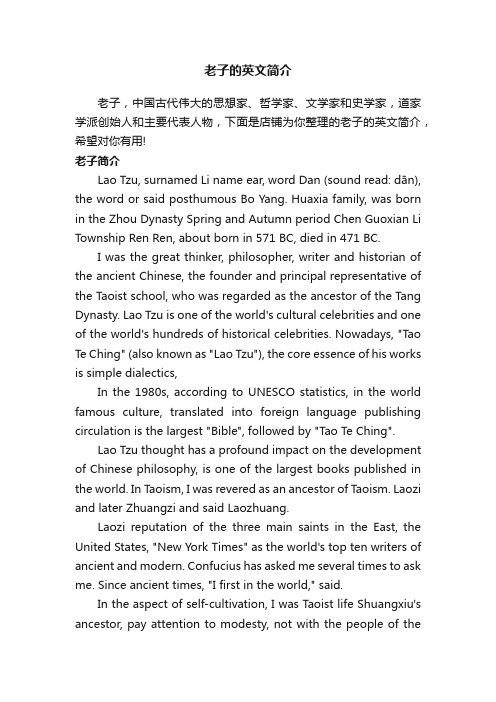
老子的英文简介老子,中国古代伟大的思想家、哲学家、文学家和史学家,道家学派创始人和主要代表人物,下面是店铺为你整理的老子的英文简介,希望对你有用!老子简介Lao Tzu, surnamed Li name ear, word Dan (sound read: dān), the word or said posthumous Bo Yang. Huaxia family, was born in the Zhou Dynasty Spring and Autumn period Chen Guoxian Li Township Ren Ren, about born in 571 BC, died in 471 BC.I was the great thinker, philosopher, writer and historian of the ancient Chinese, the founder and principal representative of the Taoist school, who was regarded as the ancestor of the Tang Dynasty. Lao Tzu is one of the world's cultural celebrities and one of the world's hundreds of historical celebrities. Nowadays, "Tao Te Ching" (also known as "Lao Tzu"), the core essence of his works is simple dialectics,In the 1980s, according to UNESCO statistics, in the world famous culture, translated into foreign language publishing circulation is the largest "Bible", followed by "Tao Te Ching".Lao Tzu thought has a profound impact on the development of Chinese philosophy, is one of the largest books published in the world. In Taoism, I was revered as an ancestor of Taoism. Laozi and later Zhuangzi and said Laozhuang.Laozi reputation of the three main saints in the East, the United States, "New York Times" as the world's top ten writers of ancient and modern. Confucius has asked me several times to ask me. Since ancient times, "I first in the world," said.In the aspect of self-cultivation, I was Taoist life Shuangxiu's ancestor, pay attention to modesty, not with the people of thepractice. In politics, I advocate ignorance and rule, do not teach. In the power of surgery, I will pay special attention to the truth.Because I was the founder of Taoism, so I was the ancients known as "too Laojun."老子人物生平Laozi (about 571 BC - 471 BC): the word Bo Yang, posthumous title Dan, also known as Li Er (ancient "old" and "Lee" homonym; "Dan" and "ear" synonymous), born In the Zhou dynasty Spring and Autumn period Chen Guo Kuang County Li Xiang Qu Ren Lane, has done Zhou Dynasty "keep the room of the official" (management of the book officials), is a great ancient Chinese thinkers, philosophers, writers and historians, Taoism respects ancestors, world cultural celebrities. Lao Tzu thought "inaction", "Lao Tzu" to "Road" to explain the evolution of the universe, "Tao" for the objective laws of nature, but also has a "independent change, Zhou line and not the" eternal meaning. "Lao Tzu" book includes a large number of simple dialectical point of view, such as that all things have both positive and negative, and can be transformed by the opposition, is the "anti-those who move", "is complex, good complex for the demon" "Happiness blessing of the blessing of the blessing of the disaster." And that the world things are "there" and "no" unity, "there is no life", and "no" as the basis, "the world was born in all, born in the no". He was on the people of the motto: "The day of the road, loss and more than fill the lack of people's way is not, the loss is not enough to have more than"; "people of hunger, with its food on the number of" , With its survival on the thick ";" people do not fear death, how can the fear of death. " His philosophical thought and the Taoist school founded by him not only made an important contribution to the development ofancient Chinese ideology and culture, but also had a far-reaching impact on China's ideological and cultural development over the past two years. On his identity, some people think that he is the old Lai Zi, is the Chu people, with the same time, had written fifteen propaganda Taoist use.Old Dan longevity, one hundred and one years old death, the neighborhood are to condolences Old people cry, such as crying his son; less cry, such as crying his mother. Read the loneliness of the people, with the people's feelings, the world no dispute, soft mercy of the big German and beneath, are sad not self-defeating. Old Dan friends Qin lost to condolence, to Laozi Ling next, do not kneel do not worship, hand to pay tribute, crying three times to the end. When the want to turn back, the neighbors stopped and asked: "Lu You Laozi friends almost?" Qin lost answer; "Of course." Zorpians said: "both for my friends, so thin and serene, can be?" Road, "why not?" Neighbors heard this, by the anger, loudly asked: "What reason?" Qin Lixiao said: "My friend Dan Dan have words, students do not like, dead is not sad. Ru can be heard from the old Dan Dan's life also from the so, from gas, from time to time, with the natural reason, what hi Zai? T oday, the old Dan's death also, by the return, It is thought that sadness and sadness, release when you are born, died when the fear of death , Are to have their own wishes and forced to be born, and forced to die, are back to the natural reason and any of the feelings of the situation, such as security and the Department of Shun, then the music can not enter also, and back natural, contrary to justice, together Do not meet the road, for the old Dan friends almost old Dan friends, follow their words and move, along the road and the lineer. I both old Dan friends, it can be rationalized, so not . "Neighbors heard of it, seems to have realized, asked: "Runeither sorrow, nor crying why three times?" Qin Yi smiled and said: "I have wept three times, not because of sad too, is also said goodbye to the old Dan. One, made its seasonal born, also co-Ziranzhili Two, made its death in season, also co Ziranzhili;. on the 3rd, in the words of its natural inaction Shi Chuan Road, close Ziranzhili too. old Dan give full and seasonal, and only move Hop Road, what I sad indeed? "people neighbor heard of it, Jie Yan Qin Yi is the old Dan really friendly, so people push their main burial. When combined soil, the Qin Yi Chung condolence and said: "Old Dan King, for good, God Datong tour, Immortal Fame."。
老子简介 英文PPT

Name:Li Er (李耳);Li Dan (李聃) Courtesy name:Bo Yang (伯阳)
《史记· 卷063· 老子列传》:
“老子者,楚苦县厉乡曲仁里人也。姓李氏,名耳,字聃,周守藏室之史也。
《史记正义》:
“老子,楚国苦县厉乡曲仁里人也。
姓李,名耳,字伯阳。一名重耳,外字聃。
大 圣 祖 高 上 大 广 道 金 阙 玄 元 天 皇 大 帝
The posthumously confer
Tang Gaozong ——Taishangxuanyuan emperor
Tang xuanzong ——Da sheng zu xuan yuan emperor ——Sheng zu da dao xuan yuan emperor ——Da sheng zu gao shang guang dao jin que xuan yuan tian emperor
谢谢观赏
身长八尺八寸,黄色美眉,长耳大目,广额疏齿,方口厚唇,日月角悬,鼻有双 周时人,李母怀胎八十一年而生。”
NAME !
姓——《说文解字》云:“姓,人之所生也。 古之神圣,母感天而生子,故称天子, 从女从生。” 氏——同一母系血统,区别其他支族的称号。 名——《说文解字》云:“名,自命也,从口夕, 夕者冥也,冥不相见,故以口自名。” 字——字由名演化而来,所以统称“名字”。
(Classic of the Way and Virtue)
Influenced [show]: Chuang Tzu
Part one
Laozi is traditionally regarded as
the founder of Taoism,
一篇关于老子的英语作文
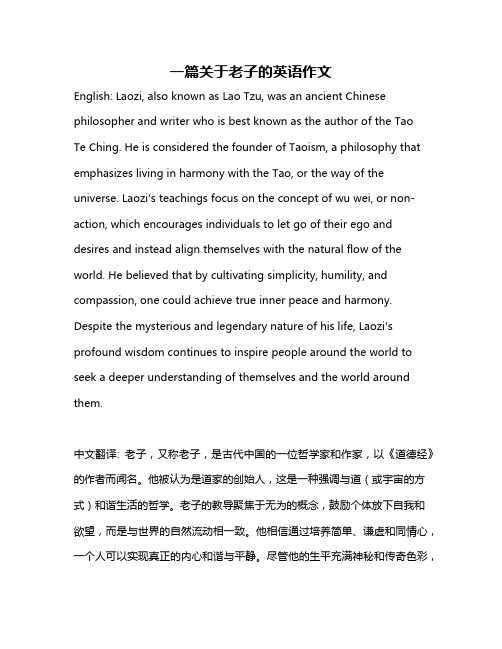
一篇关于老子的英语作文English: Laozi, also known as Lao Tzu, was an ancient Chinese philosopher and writer who is best known as the author of the TaoTe Ching. He is considered the founder of Taoism, a philosophy that emphasizes living in harmony with the Tao, or the way of the universe. Laozi's teachings focus on the concept of wu wei, or non-action, which encourages individuals to let go of their ego and desires and instead align themselves with the natural flow of the world. He believed that by cultivating simplicity, humility, and compassion, one could achieve true inner peace and harmony. Despite the mysterious and legendary nature of his life, Laozi's profound wisdom continues to inspire people around the world to seek a deeper understanding of themselves and the world around them.中文翻译: 老子,又称老子,是古代中国的一位哲学家和作家,以《道德经》的作者而闻名。
老子的人物介绍英语作文
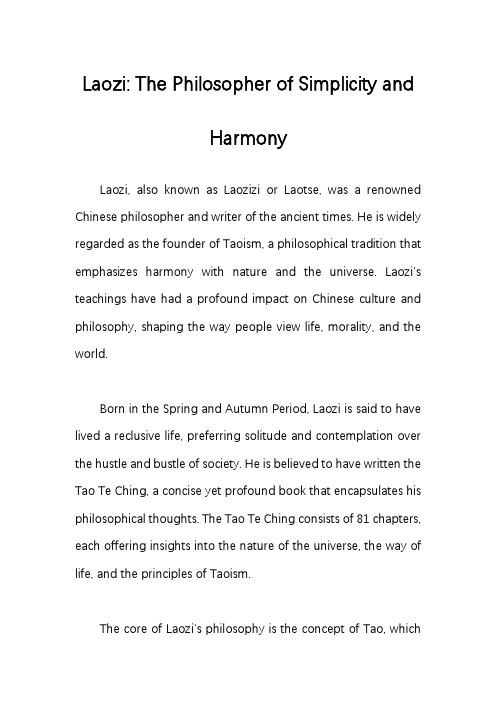
Laozi: The Philosopher of Simplicity andHarmonyLaozi, also known as Laozizi or Laotse, was a renowned Chinese philosopher and writer of the ancient times. He is widely regarded as the founder of Taoism, a philosophical tradition that emphasizes harmony with nature and the universe. Laozi's teachings have had a profound impact on Chinese culture and philosophy, shaping the way people view life, morality, and the world.Born in the Spring and Autumn Period, Laozi is said to have lived a reclusive life, preferring solitude and contemplation over the hustle and bustle of society. He is believed to have written the Tao Te Ching, a concise yet profound book that encapsulates his philosophical thoughts. The Tao Te Ching consists of 81 chapters, each offering insights into the nature of the universe, the way of life, and the principles of Taoism.The core of Laozi's philosophy is the concept of Tao, whichcan be translated as "the way" or "the path." Tao is understood as the fundamental principle of the universe, governing the flow of all things. Laozi believed that by following the natural flow of Tao, people can achieve harmony and balance in their lives. He advocated a life of simplicity, detachment, and non-action, believing that true wisdom lies in understanding and embracing the natural order of the universe.One of the key principles of Laozi's philosophy is wu Wei, which translates to "non-action" or "inactive action." This principle emphasizes the importance of letting things unfold naturally without forcing or manipulating them. Laozi believed that true leadership and wisdom come from a state of effortless action, where one allows things to happen according to their natural course. This principle finds resonance in modern leadership theories that emphasize the importance of delegation, empowerment, and creating an enabling environment for others to excel.Laozi also emphasized the importance of inner peace and tranquility. He believed that a person's happiness and fulfillmentdepend not on external possessions or achievements but on the state of their inner being. By cultivating a calm and peaceful mind, one can overcome the challenges and difficulties of life with ease and grace. This emphasis on inner growth and self-development has influenced many Eastern spiritual traditions, including yoga, meditation, and mindfulness practices.Laozi's philosophy also has a strong ecological bent. He advocated living in harmony with nature, respecting its rhythms and cycles, and avoiding unnecessary interference. His teachings emphasize sustainability, conservation, and a harmonious relationship between humanity and the natural world. In today's era of environmental degradation and climate change, Laozi's ecological wisdom offers valuable insights and guidance for sustainable living.In conclusion, Laozi's philosophy is a profound and timeless wisdom that encourages simplicity, harmony, and inner growth. His teachings on Tao, Wu Wei, inner peace, and ecological sustainability have influenced countless individuals and cultures throughout history. His legacy continues to inspire and guidepeople seeking a deeper understanding of life's meaning and purpose.**老子:简约与和谐的哲学家**老子,又被称为老聃或李耳,是中国古代著名的哲学家和作家。
一篇介绍老子的英语作文
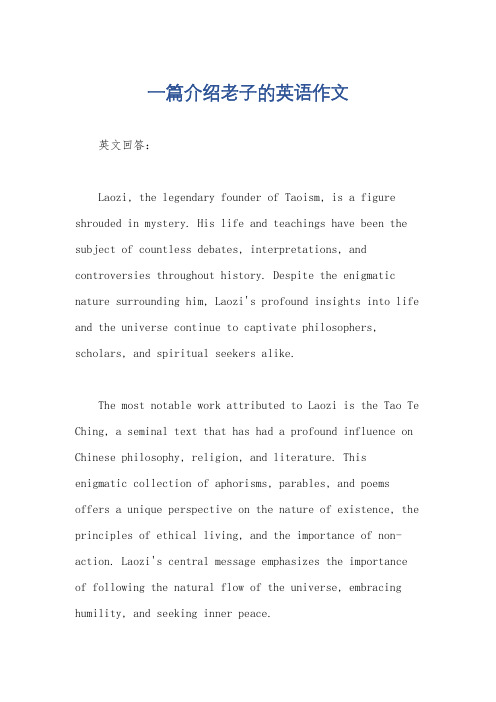
一篇介绍老子的英语作文英文回答:Laozi, the legendary founder of Taoism, is a figure shrouded in mystery. His life and teachings have been the subject of countless debates, interpretations, and controversies throughout history. Despite the enigmatic nature surrounding him, Laozi's profound insights into life and the universe continue to captivate philosophers, scholars, and spiritual seekers alike.The most notable work attributed to Laozi is the Tao Te Ching, a seminal text that has had a profound influence on Chinese philosophy, religion, and literature. This enigmatic collection of aphorisms, parables, and poems offers a unique perspective on the nature of existence, the principles of ethical living, and the importance of non-action. Laozi's central message emphasizes the importance of following the natural flow of the universe, embracing humility, and seeking inner peace.Throughout the Tao Te Ching, Laozi exhorts his readers to surrender to the enigmatic force that he refers to as the Tao, which can be loosely translated as the Way or the natural order of things. By aligning themselves with the Tao, individuals can tap into a profound source of wisdom, energy, and vitality. Laozi believed that the pursuit of knowledge and external validation often leads to delusion and frustration, while embracing simplicity and yielding to the flow of life brings true fulfillment.One of the most central tenets of Laozi's philosophy is the concept of wu-wei, which means "non-action" or "effortless action." This principle suggests that instead of actively striving to control or manipulate the world around us, we should cultivate a state of receptivity and non-resistance. By surrendering to the natural order of things, we can effortlessly align ourselves with the universe's inherent rhythm and harmony.中文回答:老子,这位道教的鼻祖,是一位被神秘色彩所笼罩的人物。
老子简介英文作文

老子简介英文作文英文:Laozi, also known as Lao Tzu, was a Chinese philosopher and writer who lived in the 6th century BCE. He is considered the founder of Taoism, a philosophy that emphasizes living in harmony with the Tao, or the natural way of the universe.Laozi's most famous work is the Tao Te Ching, a collection of 81 short poems that offer guidance on how to live a fulfilling and meaningful life. The Tao Te Ching has been translated into many languages and is still widely read today.One of the key teachings of Laozi is the concept of wu wei, which means "non-action" or "effortless action." This does not mean being lazy or inactive, but rather letting go of the need to control everything and allowing things to happen naturally.Another important concept in Laozi's philosophy is the idea of yin and yang, which represents the balance of opposing forces in the universe. This balance is essential for harmony and well-being.Overall, Laozi's teachings emphasize the importance of living simply and in harmony with nature, letting go of ego and desire, and finding inner peace and contentment.中文:老子,也被称为老子,是一位生活在公元前6世纪的中国哲学家和作家。
老子的英文简介
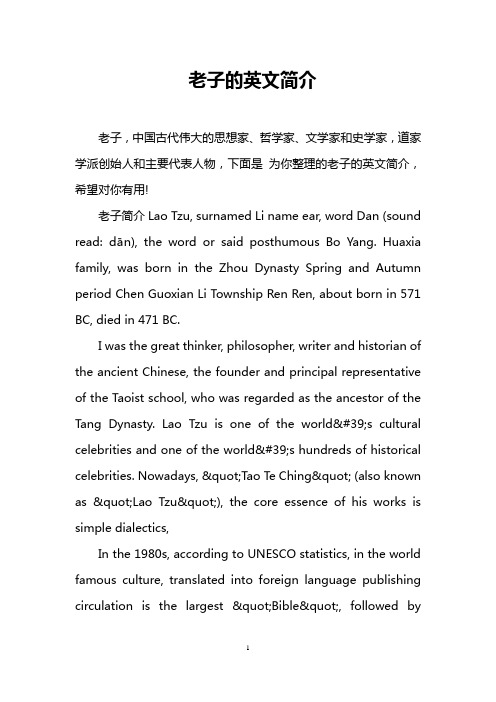
老子的英文简介老子,中国古代伟大的思想家、哲学家、文学家和史学家,道家学派创始人和主要代表人物,下面是为你整理的老子的英文简介,希望对你有用!老子简介Lao Tzu, surnamed Li name ear, word Dan (sound read: dān), the word or said posthumous Bo Yang. Huaxia family, was born in the Zhou Dynasty Spring and Autumn period Chen Guoxian Li Township Ren Ren, about born in 571 BC, died in 471 BC.I was the great thinker, philosopher, writer and historian of the ancient Chinese, the founder and principal representative of the Taoist school, who was regarded as the ancestor of the Tang Dynasty. Lao Tzu is one of the world's cultural celebrities and one of the world's hundreds of historical celebrities. Nowadays, "T ao T e Ching" (also known as "Lao Tzu"), the core essence of his works is simple dialectics,In the 1980s, according to UNESCO statistics, in the world famous culture, translated into foreign language publishing circulation is the largest "Bible", followed by"Tao Te Ching".Lao Tzu thought has a profound impact on the development of Chinese philosophy, is one of the largest books published in the world. In Taoism, I was revered as an ancestor of Taoism. Laozi and later Zhuangzi and said Laozhuang.Laozi reputation of the three main saints in the East, the United States, "New York Times" as the world's top ten writers of ancient and modern. Confucius has asked me several times to ask me. Since ancient times, "I first in the world," said.In the aspect of self-cultivation, I was Taoist life Shuangxiu's ancestor, pay attention to modesty, not with the people of the practice. In politics, I advocate ignorance and rule, do not teach. In the power of surgery, I will pay special attention to the truth.Because I was the founder of Taoism, so I was the ancients known as "too Laojun."老子人物生平Laozi (about 571 BC - 471 BC): the word Bo Yang, posthumous title Dan, also known as Li Er (ancient "old" and "Lee" homonym; "Dan" and "ear" synonymous), bornIn the Zhou dynasty Spring and Autumn period Chen Guo Kuang County Li Xiang Qu Ren Lane, has done Zhou Dynasty "keep the room of the official" (management of the book officials), is a great ancient Chinese thinkers, philosophers, writers and historians, Taoism respects ancestors, world cultural celebrities. Lao Tzu thought "inaction", "Lao Tzu" to "Road" to explain the evolution of the universe, "Tao" for the objective laws of nature, but also has a "independent change, Zhou line and not the" eternal meaning. "Lao Tzu" book includes a large number of simple dialectical point of view, such as that all things have both positive and negative, and can be transformed by the opposition, is the "anti-those who move", "is complex, good complex for the demon" "Happiness blessing of the blessing of the blessing of the disaster." And that the world things are "there" and "no" unity, "there is no life", and "no" as the basis, "the world was born in all, born in the no". He was on the people of the motto: "The day of the road, loss and more than fill the lack of people's way is not, the lossis not enough to have more than"; "people of hunger, with its food on the number of" , With its survival on the thick ";" people do not fear death, how can the fear of death. " His philosophical thought and the T aoist school founded by him not only made an important contribution to the development of ancient Chinese ideology and culture, but also had a far-reaching impact on China's ideological and cultural development over the past two years. On his identity, some people think that he is the old Lai Zi, is the Chu people, with the same time, had written fifteen propaganda T aoist use.Old Dan longevity, one hundred and one years old death, the neighborhood are to condolences Old people cry, such as crying his son; less cry, such as crying his mother. Read the loneliness of the people, with the people's feelings, the world no dispute, soft mercy of the big German and beneath, are sad not self-defeating. Old Dan friends Qin lost to condolence, to Laozi Ling next, do not kneel do not worship, hand to pay tribute, crying three times to the end. When the want to turn back, the neighbors stopped and asked: "Lu You Laozi friends almost?" Qin lost answer; "Of course." Zorpians said: "both for myfriends, so thin and serene, can be?" Road, "why not?" Neighbors heard this, by the anger, loudly asked: "What reason?" Qin Lixiao said: "My friend Dan Dan have words, students do not like, dead is not sad. Ru can be heard from the old Dan Dan's life also from the so, from gas, from time to time, with the natural reason, what hi Zai? Today, the old Dan's death also, by the return, It is thought that sadness and sadness, release when you are born, died when the fear of death , Are to have their own wishes and forced to be born, and forced to die, are back to the natural reason and any of the feelings of the situation, such as security and the Department of Shun, then the music can not enter also, and back natural, contrary to justice, together Do not meet the road, for the old Dan friends almost old Dan friends, follow their words and move, along the road and the lineer. I both old Dan friends, it can be rationalized, so not . "Neighbors heard of it, seems to have realized, asked: "Ru neither sorrow, nor crying why three times?" Qin Yi smiled and said: "I have wept three times, not because of sad too, is also said goodbye to the old Dan. One, made its seasonal born, also co-Ziranzhili Two, made its death in season, also co Ziranzhili;. on the 3rd, in the words of itsnatural inaction Shi Chuan Road, close Ziranzhili too. old Dan give full and seasonal, and only move Hop Road, what I sad indeed? "people neighbor heard of it, Jie Yan Qin Yi is the old Dan really friendly, so people push their main burial. When combined soil, the Qin Yi Chung condolence and said: "Old Dan King, for good, God Datong tour, Immortal Fame."老子的英文简介。
老子的人物介绍英语作文
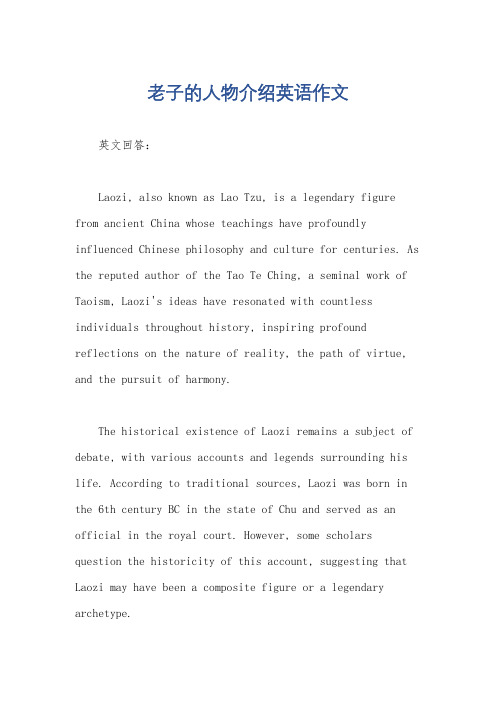
老子的人物介绍英语作文英文回答:Laozi, also known as Lao Tzu, is a legendary figure from ancient China whose teachings have profoundly influenced Chinese philosophy and culture for centuries. As the reputed author of the Tao Te Ching, a seminal work of Taoism, Laozi's ideas have resonated with countless individuals throughout history, inspiring profound reflections on the nature of reality, the path of virtue, and the pursuit of harmony.The historical existence of Laozi remains a subject of debate, with various accounts and legends surrounding his life. According to traditional sources, Laozi was born in the 6th century BC in the state of Chu and served as an official in the royal court. However, some scholars question the historicity of this account, suggesting that Laozi may have been a composite figure or a legendary archetype.Despite the uncertainty surrounding his biography,Laozi's teachings have left an enduring legacy. The Tao Te Ching, attributed to him, presents a comprehensiveexposition of Taoist philosophy, which emphasizes the importance of living in accordance with the natural order, embracing humility, and seeking inner peace. Laozi's ideas have deeply influenced Chinese culture, shaping ethical values, political thought, and artistic expression throughout history.中文回答:老子,又称老子,是中国古代的传奇人物,他的学说对中国哲学和文化产生了深远的影响。
介绍老子英文作文
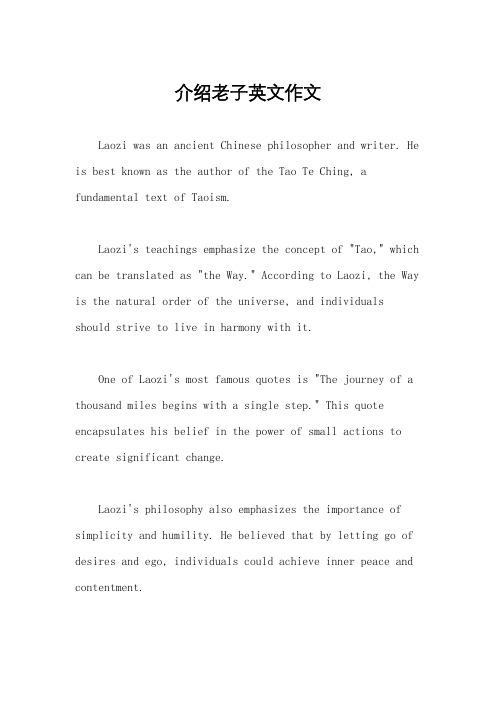
介绍老子英文作文Laozi was an ancient Chinese philosopher and writer. He is best known as the author of the Tao Te Ching, a fundamental text of Taoism.Laozi's teachings emphasize the concept of "Tao," which can be translated as "the Way." According to Laozi, the Way is the natural order of the universe, and individuals should strive to live in harmony with it.One of Laozi's most famous quotes is "The journey of a thousand miles begins with a single step." This quote encapsulates his belief in the power of small actions to create significant change.Laozi's philosophy also emphasizes the importance of simplicity and humility. He believed that by letting go of desires and ego, individuals could achieve inner peace and contentment.In addition to his philosophical teachings, Laozi is also credited with developing the concept of wu wei, which can be translated as "non-action" or "effortless action." This concept encourages individuals to act in accordance with the natural flow of the universe, rather than trying to force outcomes through excessive effort.Overall, Laozi's teachings continue to have a profound influence on Eastern philosophy and spirituality. His emphasis on living in harmony with the natural order and cultivating inner peace resonates with people from all walks of life.。
介绍老子思想的英语作文
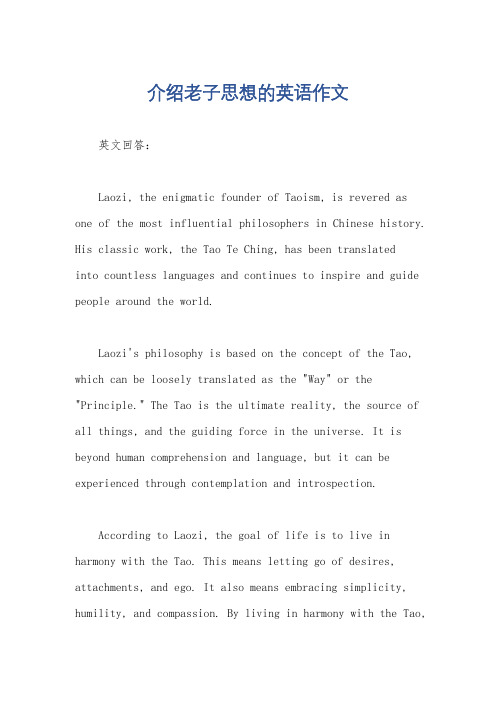
介绍老子思想的英语作文英文回答:Laozi, the enigmatic founder of Taoism, is revered as one of the most influential philosophers in Chinese history. His classic work, the Tao Te Ching, has been translatedinto countless languages and continues to inspire and guide people around the world.Laozi's philosophy is based on the concept of the Tao, which can be loosely translated as the "Way" or the "Principle." The Tao is the ultimate reality, the source of all things, and the guiding force in the universe. It is beyond human comprehension and language, but it can be experienced through contemplation and introspection.According to Laozi, the goal of life is to live in harmony with the Tao. This means letting go of desires, attachments, and ego. It also means embracing simplicity, humility, and compassion. By living in harmony with the Tao,we can find inner peace and happiness, and we can contribute to the well-being of the world.Laozi's philosophy has been interpreted in many different ways over the centuries. Some people see it as a religion, while others see it as a philosophy of life. However, regardless of how it is interpreted, Laozi's teachings continue to offer valuable insights into the nature of reality and the human condition.中文回答:老子,道教的创始人,被尊为中国历史上最有影响力的哲学家之一。
- 1、下载文档前请自行甄别文档内容的完整性,平台不提供额外的编辑、内容补充、找答案等附加服务。
- 2、"仅部分预览"的文档,不可在线预览部分如存在完整性等问题,可反馈申请退款(可完整预览的文档不适用该条件!)。
- 3、如文档侵犯您的权益,请联系客服反馈,我们会尽快为您处理(人工客服工作时间:9:00-18:30)。
Non-action无为
Dao or the Way acts through non-action. He did not mean that one should do nothing and passively wait for something to be achieved. Neither did he deny human creativity. What he meant is that human enterprises should be built on the basis of naturalness, not on any attempts to interrupt the rhythm of nature. Human creativity should be in compliance with the ways of nature.
★Name: Lao Dan, Lao Zi ★770——476BC, the Spring and Autumn Period ★Birth place: Luyi, (鹿邑) Henan Province ★Founder of Taoism
★曾做过周朝“守藏室之官”(管理 藏书的官员),是中国最伟大的哲学 家和思想家之一,被道教尊为教祖, 世界文化名人。 ★河南鹿邑太清宫位于李鹏总理 亲笔题写的“老子故里”河南省鹿 邑县城东十里太清宫镇,太清宫镇 有一座驰名中外的“太清宫”,这 里就是老子的诞生地,也是历朝历 代供奉祭祀老子的祠庙。
It has also exerted a direct impact on the characteristics, trends of thought and aesthetic sensibilities of the Chinese nation. Today Laozi still plays a role in the development of Chinese thinking. Laozi was first introduced into Europe possibly as early as the 15th century and has been one of the most translated philosophical works of ancient China.
Great Ingenuity Appears to Be Stupidity 大巧若拙
This is the essence of " naturalness" and "non-action". "Great ingenuity " refers to the highest level of ingenuity, arising so naturally that it dos not resemble ingenuity at all. Ingenuity can be achieved through human effort, but "great ingenuity" is superior to ordinary ingenuity.
Returning to a Newborn State
★ Laozi saw the world as a madding crowd of vanity. He chose to live a simple, quite life, and to keep his mind undisturbed in the face of temptation. He said he would rather remain a “newborn baby.” ★The state of the newborn is free of any knowledge, desire, impurity or falsehood. (complete innocence)
河南鹿邑太清宫
鹿邑还是中国第一大姓——李姓的发 源地,是全球李姓华人寻根问祖的胜地。 天下李姓,根在鹿邑。老子是李姓子孙 的先祖,据《李氏祖脉源流》记载李渊、 李世民认老子为先祖。鹿邑作为李姓的 发源地,充分利用这一优势,成立了中 国鹿邑李氏文化研究总会,撰写了《李 姓起源鹿邑》、《老子与李姓》等论文, 在全国多次获奖;拍摄了电视剧《李氏 春秋》;举办了海峡两岸李氏 宗亲恳亲会。
Many of Laozi’s enlightening views are based on his philosophy of naturalness (自然主义) and non-action(无为).
Naturalness自然主义;顺其自然
It refers to a natural state of being, an attitude of following the way of nature. Laozi emphasized that everything in the world has its own way of being and developing: birds fly in the sky, fish swim in the water, flowers bloom and flowers fall. He admonished people to give up on any desires to control the world.
Laozi/Classic of the Way and Virtue/Dao de jing
Classic of the Way and Virtue
★ 5,000 Chinese characters ★ 81 chapters ★ two parts, Dao (the way) and De (Virtue). It became the basis of Daoism, the school of philosophy parallel to Confucianism in Ancient China. The thought of Laozi formed the foundation of Daoism, the most influential indigenous school of religion in China.
To Laozi, resorting to deceit is true futility and would accomplish just the opposite result. Those who intend to play tricks are not genuine and therefore are not natural. Deceit is detrimental to naturalness and to the harmony of life.
★ Waternourishes everything but nourishes everything but ★ Water contends for contends fornothing. nothing.水善利万物而不争。 水善利万物而不争。 老子的《道德经》第八章:“上善 若水。水善利万物而不争,处众人 之所恶,故几于道。居善地,心善 渊,与善仁,言善信,政善治,事 善能,动善时。夫唯不争,故无尤。”
ozi 1.1 A Brief Introduction 1.2 His Hometown 2. Primary ideology 2.1 Naturalness and Non-action 2.2 The Philosophy of Non-contention 2.3 Returning to Newborn State 3. Cultural Heritage
According to Laozi, war springs from humanity’s bloated desires. Conflicts arises out of people’s struggles to satisfy their desires, and conflict escalates into war. Therefore, Laozi’s philosophy is based on “non-contention.” To him, human striving and competitive strife is the root of decline; desiring nothing is the natural way of life.
The Philosophy of Non-contention 无争
On the basis of “natuห้องสมุดไป่ตู้alness” and “non -action,” Laozi proposed the view of “overcoming the strong by being weak.” The era Laozi lived in was replete with endless wars. Therefore, war was an important theme for philosophers, and anti-war thinking was the norm.
★Nothing in the world is weaker than water when it comes to breaking something strong.天下莫柔弱于水, 而攻坚强者莫之能胜。 Water is a typical example of the weak winning over the strong. Water is invincible because it desires nothing and contends for nothing.
★ The greatest virtue is like water.
“上善若水”意为最高境界的善行就像 水的品性一样,泽被万物而不争名利。 上善:至善,最完美; 水:这里喻指与世无争的圣人。 达到尽善尽美的境界,就和圣人差不多。 水有滋养万物的德行,它使万物得到 它的利益,而不与万物发生矛盾、冲突, 故天下最大的善性莫如水。
